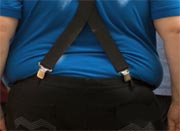
MONDAY, April 16 (HealthDay News) — A bariatric surgical procedure is more likely than medicine to improve or even reverse type 2 diabetes in very obese patients, a new small study indicates.
Italian researchers compared standard diabetes medicine with a surgical procedure known as the laparoscopic sleeve gastrectomy, and while 80 percent of those treated with the surgery had remission of their diabetes within 18 months, none of those treated with medicine did.
“In our opinion, 80 percent diabetes resolution is a dramatically excellent result, compared with results of a medical approach in which there’s not diabetes resolution,” said lead researcher Dr. Nicola Basso, a professor of surgery at the University of Rome, Sapienza.
All of those who had surgery and had diabetes less than 10 years reversed it, Basso said.
The study appeared online April 16 in the Archives of Surgery.
In the procedure, doctors remove about 85 percent of the stomach and shape the remaining portion into a tube or sleeve. Fewer calories can be eaten, and weight loss is the result.
“At present, we think that sleeve gastrectomy may be considered the surgical procedure of choice in treating ‘diabesity,'” said Basso.
The researchers assigned 30 patients to the surgery group and another 30 to the medicine group. All had a body-mass index (BMI) of 35 or higher. With BMI, which takes both height and weight into account, 30 is the beginning of the obese category.
A person who is 5-foot-10 and weighs 250 pounds has a BMI of nearly 36.
Basso’s team followed the patients for 18 months to see what effect the treatments had on their diabetes and other health measures.
The surgery group’s average BMI went from 41 to about 28. The medicine group’s BMI, 39 on average at the start, went up slightly.
Those who had the surgery had improvements in other areas. Sleep apnea dropped from 50 percent to 10 percent. After surgery, patients reduced their use of medicine for high blood pressure and cholesterol problems.
None in the medicine group reversed their diabetes. Their need for high blood pressure medicine and cholesterol medicines increased, although not significantly. Their sleep apnea did not change.
The study results are not surprising, said Dr. Ronald Goldberg, a professor of medicine at the Diabetes Research Institute at the University of Miami Miller School of Medicine.
“It’s fairly in line with previous research using different bypass procedures,” he said.
The latest findings could be very good news for very obese patients with diabetes, he said.
“The milder type is much more likely to go into remission than someone who has longstanding or complicated diabetes,” he said. The procedure is worth consideration by someone who is very obese and has type 2 diabetes, he added.
The cost of the procedure in the United States is between $10,000 and $15,000.
“There is no question that over the short term, surgery has to be more expensive,” Goldberg said. “But with time, the increased cost of managing diabetes, and particularly its complications, would make a cost-benefit comparison more meaningful.”
More information
To learn more about diabetes, visit the American Diabetes Association.

